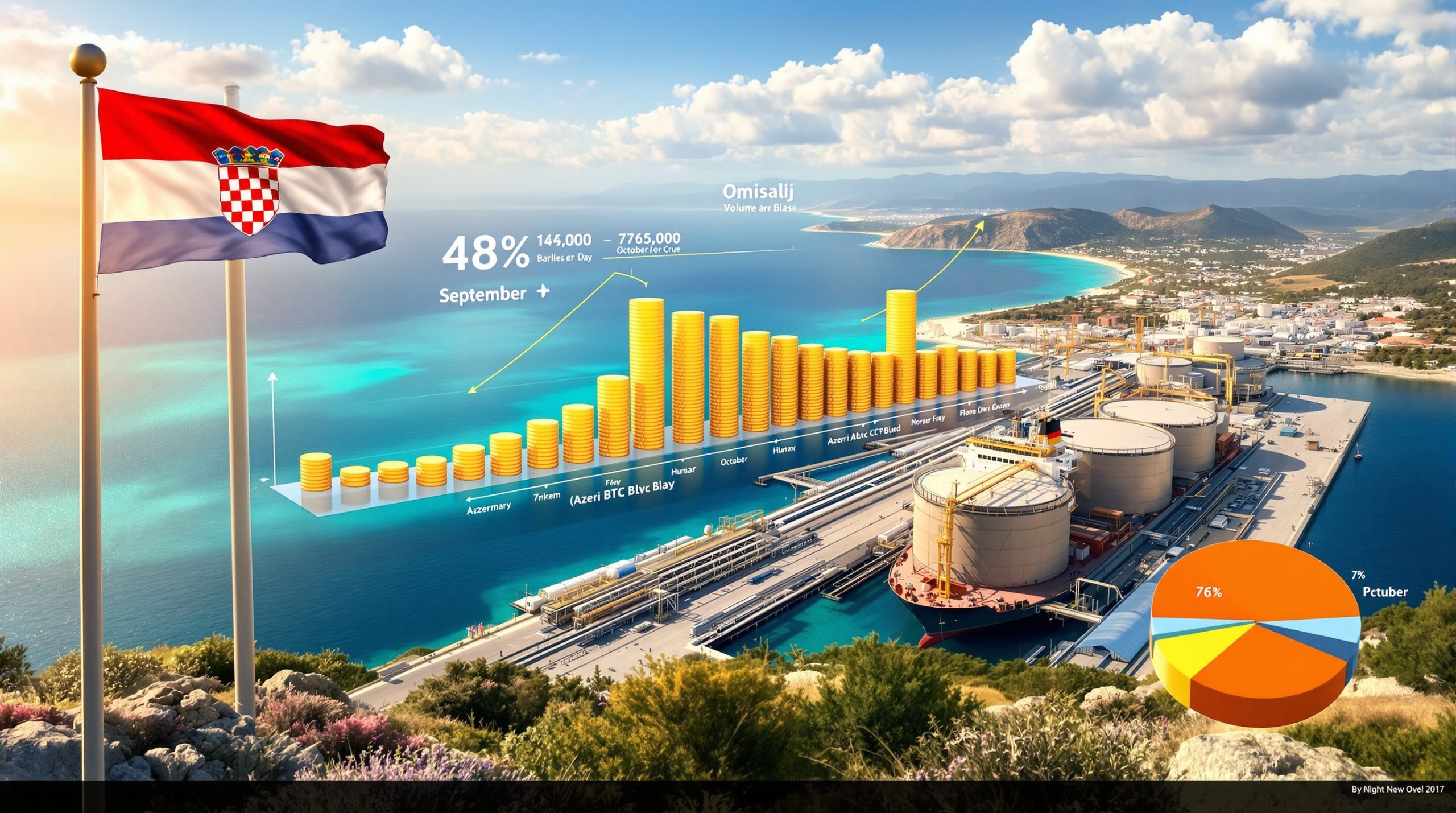Strategic Importance of the Novorossiysk Terminal in Russia's Energy Infrastructure
Russia's Black Sea export facilities form the backbone of the country's petroleum revenue stream, with the Novorossiysk terminal representing a critical component of this infrastructure network. The recent Ukraine strike on Russian export hub has demonstrated the vulnerability of these strategic assets and their importance to global energy markets. Located on Russia's southern coast, this facility has historically served as one of the nation's primary crude oil export points, handling substantial volumes of petroleum destined for international markets.
The terminal's significance extends beyond simple logistics. Energy analysts have long recognised Novorossiysk's role in maintaining Russia's position within global energy supply chains. The facility's capacity to process and export substantial daily volumes makes it a vital economic asset for the Russian Federation's energy sector.
Critical Infrastructure Components
The Novorossiysk complex encompasses multiple operational elements that work in coordination to facilitate crude oil exports:
- Loading terminals: Multiple berths designed for large-scale tanker operations
- Pipeline networks: Extensive infrastructure connecting inland production to coastal facilities
- Storage systems: Tank farms providing temporary holding capacity for export-bound crude
- Pumping stations: Critical machinery enabling oil movement through the facility
Details of the November 2025 Ukrainian Operations
Recent reports from energy market sources, including coverage from Reuters, confirm that Ukrainian forces executed a coordinated operation targeting Russian energy infrastructure. The strike specifically focused on export facilities along Russia's Black Sea coast, representing an escalation in Ukraine's campaign against Russian energy assets.
Market headlines documented the immediate impact of this Ukraine strike on Russian export hub operations. These reports indicate the operation successfully disrupted normal export operations at the targeted facility, creating significant market volatility.
Operational Impact Assessment
The Ukrainian operation targeted multiple components simultaneously, creating cascading effects throughout the terminal's operational capacity. Industry observers noted that such coordinated strikes aim to maximise disruption by affecting interconnected systems rather than isolated components.
The timing of the operation coincided with elevated tensions surrounding Russian energy exports, particularly given ongoing international sanctions and market volatility. Furthermore, the oil price rally has been influenced by supply chain concerns stemming from geopolitical events.
Energy security analysts have highlighted how infrastructure vulnerabilities become magnified during periods of geopolitical instability. The incident raises questions about the resilience of global energy infrastructure in conflict zones.
Market Response to Export Disruptions
Global oil markets reacted swiftly to news of the Ukraine strike on Russian export hub infrastructure. According to OilPrice.com reporting, current pricing data shows significant upward movement in benchmark crude prices:
| Benchmark | Current Price | Daily Change | Percentage Increase |
|---|---|---|---|
| WTI Crude | $60.18 | +$1.49 | +2.54% |
| Brent Crude | $64.44 | +$1.43 | +2.27% |
The price surge reflects immediate trader concern regarding potential supply chain disruptions. Energy markets demonstrated heightened sensitivity to geopolitical developments affecting major export infrastructure, with volatility indicators showing elevated levels following the news.
Supply Chain Implications for Global Markets
The disruption at a major Russian export facility raises broader questions about global energy supply resilience. Market participants have expressed concern about the concentrated nature of certain export routes and their vulnerability to operational interruptions.
Energy trading patterns showed immediate adjustments as market participants factored in potential longer-term supply constraints. The incident highlighted how quickly geopolitical developments can translate into market price movements, particularly for commodities dependent on specific infrastructure networks.
In addition, the OPEC production impact remains a crucial factor in determining global supply levels amid these disruptions.
The strike demonstrates how modern conflicts increasingly target economic infrastructure to achieve strategic objectives, creating ripple effects throughout global commodity markets.
Strategic Context of Ukrainian Energy Infrastructure Campaigns
Ukrainian military and intelligence operations have increasingly focused on disrupting Russian energy revenues, viewing petroleum exports as a critical funding source for military operations. This strategic approach represents a shift toward economic warfare tactics designed to undermine the financial foundations supporting Russian military capabilities.
Analysis of recent energy market reporting reveals a pattern of Ukrainian operations against Russian energy assets. The campaign appears to target various components of Russia's energy infrastructure, from refineries to export terminals, suggesting a comprehensive strategy rather than isolated incidents.
Economic Warfare Considerations
The targeting of energy infrastructure reflects Ukrainian strategic thinking that views economic pressure as complementary to direct military action. By disrupting export capabilities, Ukrainian forces aim to reduce the revenue streams that fund ongoing military operations.
International observers have noted this approach's potential effectiveness, given the central role of energy exports in Russian government finances. However, such tactics also raise questions about the broader implications for civilian energy supplies and international energy security.
The broader global market impact of these disruptions extends beyond immediate supply concerns to encompass wider economic ramifications.
Geopolitical Ramifications for Regional Energy Security
The Ukraine strike on Russian export hub highlights vulnerabilities within regional energy networks. European and global energy importers have expressed growing concern about the reliability of supply chains passing through conflict zones or politically unstable regions.
Energy security specialists have emphasised how infrastructure attacks can create uncertainty extending far beyond immediate operational impacts. The incident serves as a reminder that critical energy facilities remain vulnerable to disruption during periods of international tension.
International Energy Market Adaptations
Global energy companies and importing nations face renewed pressure to diversify supply sources and routes. The incident reinforces ongoing trends toward supply chain redundancy and alternative energy partnerships that began following earlier geopolitical tensions.
Energy analysts suggest that infrastructure protection will become an increasingly important consideration for international energy investments. The vulnerability demonstrated by recent events may accelerate investment in alternative supply routes and enhanced security measures for critical facilities.
Consequently, nations are reassessing their energy security strategy to ensure resilience against future disruptions.
Future Market Implications and Energy Security Trends
The Ukrainian strike on Russian export infrastructure represents more than a tactical military operation. It demonstrates how modern conflicts increasingly blur the lines between military and economic targets, with energy infrastructure becoming a focal point for strategic pressure.
What Are the Short-Term Market Dynamics?
Energy markets are likely to experience continued volatility as traders assess the broader implications of infrastructure targeting. Key factors influencing market stability include:
- Repair timeline uncertainties: Limited information about restoration schedules creates ongoing price uncertainty
- Alternative supply activation: Questions remain about alternative export routes' capacity utilisation
- Inventory level assessments: Current global stockpile adequacy becomes crucial for price stability
- Geopolitical development monitoring: Further escalation could amplify market reactions
Long-Term Structural Considerations
The incident may accelerate several structural changes within global energy markets:
- Enhanced infrastructure protection investments across vulnerable regions
- Accelerated development of alternative supply routes and partnerships
- Increased focus on energy supply diversification strategies
- Greater emphasis on strategic petroleum reserve management
Moreover, the expansion of Saudi exploration licenses may provide additional supply options to offset disrupted Russian exports.
Recovery Prospects and Market Stabilisation Factors
The timeline for operational restoration at affected Russian export facilities remains uncertain, with limited official information available regarding damage assessments or repair schedules. Industry experts suggest that recovery timelines depend heavily on the extent of infrastructure damage and the availability of specialised repair equipment and expertise.
Market stabilisation will likely require multiple factors to align, including successful infrastructure repairs, activation of alternative supply sources, and broader geopolitical developments. Energy analysts continue monitoring these variables to assess potential duration of current market disruptions.
Market Psychology and Trader Sentiment
Current market conditions reflect heightened sensitivity to geopolitical developments affecting energy infrastructure. Trader sentiment has shifted toward increased risk premiums for supplies originating from conflict zones or politically volatile regions.
The incident reinforces existing concerns about energy security and supply chain resilience, potentially maintaining elevated price levels even after immediate supply concerns are addressed. Market psychology often maintains risk premiums long after initial disruption events are resolved.
How Will This Impact Global Energy Security?
The Ukraine strike on Russian export hub serves as a stark reminder of modern energy security challenges. As conflicts increasingly target economic assets alongside military objectives, critical energy infrastructure faces growing vulnerability to operational disruption.
This development underscores the interconnected nature of geopolitical stability and global energy markets. The immediate price response, with crude oil benchmarks rising over 2.5%, demonstrates how quickly local infrastructure disruptions can translate into worldwide market impacts.
Energy security planners worldwide must now grapple with evolving threat landscapes that extend beyond traditional supply and demand fundamentals. Infrastructure protection, supply chain diversification, and strategic reserve management have become essential components of national energy security strategies.
However, the incident also highlights the critical importance of maintaining multiple export routes and supply partnerships in an increasingly uncertain geopolitical environment. As conflicts evolve to target economic foundations rather than purely military assets, energy infrastructure resilience becomes paramount for global market stability.
The long-term implications of such targeted strikes on energy infrastructure extend beyond immediate market volatility, potentially reshaping global energy trade patterns and investment priorities for years to come.
Disclaimer: This analysis is based on publicly available market data and news reports. Energy markets remain highly volatile, and geopolitical developments can rapidly change market conditions. Readers should consult current market sources and professional advisors for the most up-to-date information regarding energy investments and market developments.
Want to Capitalise on Energy Market Volatility?
Discovery Alert's proprietary Discovery IQ model delivers real-time alerts on significant ASX mineral discoveries, including energy and critical minerals companies that often surge during global supply disruptions like the recent Ukraine strike on Russian export infrastructure. Begin your 30-day free trial today and position yourself to identify actionable opportunities when geopolitical events create market volatility across commodity sectors.




